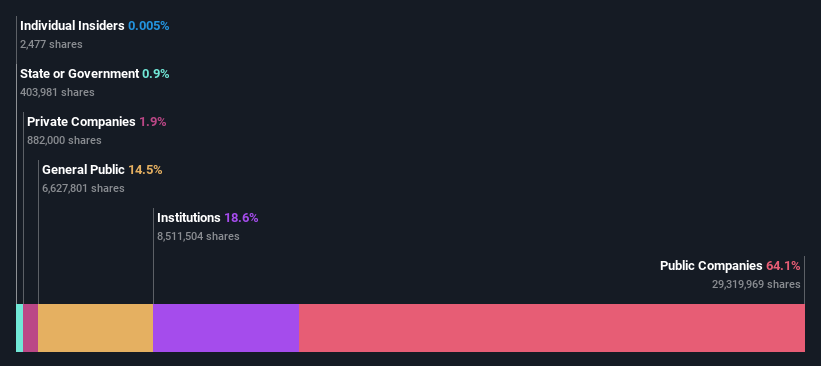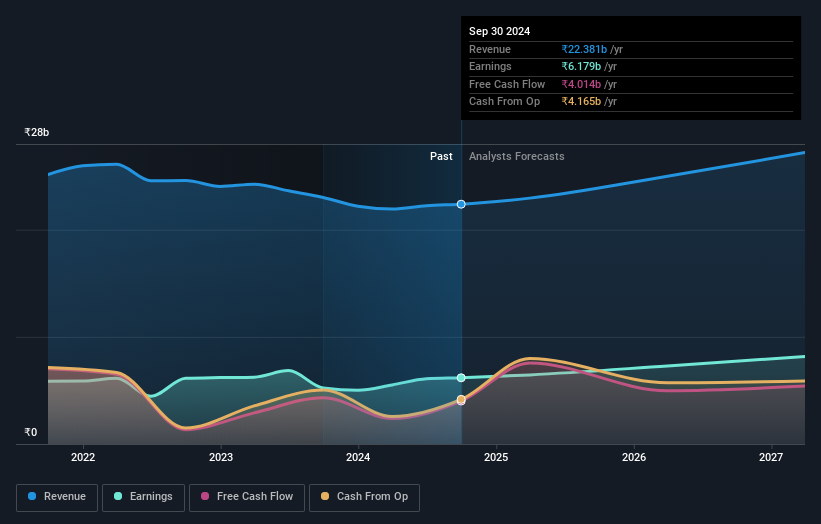Public companies who have a significant stake must be disappointed along with institutions after Pfizer Limited's (NSE:PFIZER) market cap dropped by ₹14b

Key Insights
- Pfizer's significant public companies ownership suggests that the key decisions are influenced by shareholders from the larger public
- The largest shareholder of the company is Pfizer Inc. with a 62% stake
- Institutional ownership in Pfizer is 19%
Every investor in Pfizer Limited (NSE:PFIZER) should be aware of the most powerful shareholder groups. We can see that public companies own the lion's share in the company with 64% ownership. In other words, the group stands to gain the most (or lose the most) from their investment into the company.
While institutions who own 19% came under pressure after market cap dropped to ₹227b last week,public companies took the most losses.
In the chart below, we zoom in on the different ownership groups of Pfizer.
Check out our latest analysis for Pfizer

What Does The Institutional Ownership Tell Us About Pfizer?
Institutional investors commonly compare their own returns to the returns of a commonly followed index. So they generally do consider buying larger companies that are included in the relevant benchmark index.
We can see that Pfizer does have institutional investors; and they hold a good portion of the company's stock. This can indicate that the company has a certain degree of credibility in the investment community. However, it is best to be wary of relying on the supposed validation that comes with institutional investors. They too, get it wrong sometimes. It is not uncommon to see a big share price drop if two large institutional investors try to sell out of a stock at the same time. So it is worth checking the past earnings trajectory of Pfizer, (below). Of course, keep in mind that there are other factors to consider, too.

Pfizer is not owned by hedge funds. Pfizer Inc. is currently the largest shareholder, with 62% of shares outstanding. With such a huge stake in the ownership, we infer that they have significant control of the future of the company. With 4.3% and 3.8% of the shares outstanding respectively, Life Insurance Corporation of India, Asset Management Arm and Nippon Life India Asset Management Limited are the second and third largest shareholders.
While it makes sense to study institutional ownership data for a company, it also makes sense to study analyst sentiments to know which way the wind is blowing. While there is some analyst coverage, the company is probably not widely covered. So it could gain more attention, down the track.
Insider Ownership Of Pfizer
While the precise definition of an insider can be subjective, almost everyone considers board members to be insiders. Company management run the business, but the CEO will answer to the board, even if he or she is a member of it.
I generally consider insider ownership to be a good thing. However, on some occasions it makes it more difficult for other shareholders to hold the board accountable for decisions.
Our most recent data indicates that insiders own less than 1% of Pfizer Limited. However, it's possible that insiders might have an indirect interest through a more complex structure. It is a pretty big company, so it would be possible for board members to own a meaningful interest in the company, without owning much of a proportional interest. In this case, they own around ₹12m worth of shares (at current prices). Arguably, recent buying and selling is just as important to consider. You can click here to see if insiders have been buying or selling.
General Public Ownership
The general public-- including retail investors -- own 14% stake in the company, and hence can't easily be ignored. This size of ownership, while considerable, may not be enough to change company policy if the decision is not in sync with other large shareholders.
Public Company Ownership
We can see that public companies hold 64% of the Pfizer shares on issue. It's hard to say for sure but this suggests they have entwined business interests. This might be a strategic stake, so it's worth watching this space for changes in ownership.
Next Steps:
I find it very interesting to look at who exactly owns a company. But to truly gain insight, we need to consider other information, too. For example, we've discovered 1 warning sign for Pfizer that you should be aware of before investing here.
If you would prefer discover what analysts are predicting in terms of future growth, do not miss this free report on analyst forecasts.
NB: Figures in this article are calculated using data from the last twelve months, which refer to the 12-month period ending on the last date of the month the financial statement is dated. This may not be consistent with full year annual report figures.
New: Manage All Your Stock Portfolios in One Place
We've created the ultimate portfolio companion for stock investors, and it's free.
• Connect an unlimited number of Portfolios and see your total in one currency
• Be alerted to new Warning Signs or Risks via email or mobile
• Track the Fair Value of your stocks
Have feedback on this article? Concerned about the content? Get in touch with us directly. Alternatively, email editorial-team (at) simplywallst.com.
This article by Simply Wall St is general in nature. We provide commentary based on historical data and analyst forecasts only using an unbiased methodology and our articles are not intended to be financial advice. It does not constitute a recommendation to buy or sell any stock, and does not take account of your objectives, or your financial situation. We aim to bring you long-term focused analysis driven by fundamental data. Note that our analysis may not factor in the latest price-sensitive company announcements or qualitative material. Simply Wall St has no position in any stocks mentioned.
About NSEI:PFIZER
Pfizer
Engages in manufacturing, marketing, trading, and export of pharmaceutical products in India and internationally.
Flawless balance sheet with proven track record and pays a dividend.

